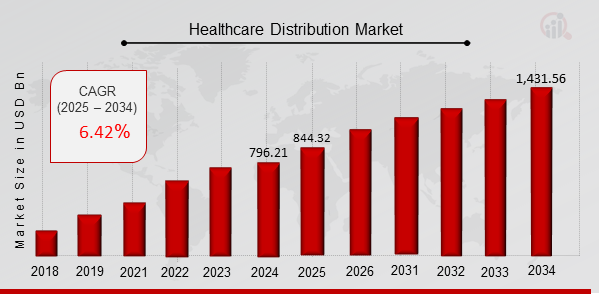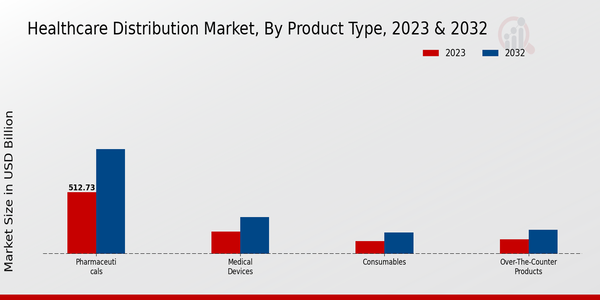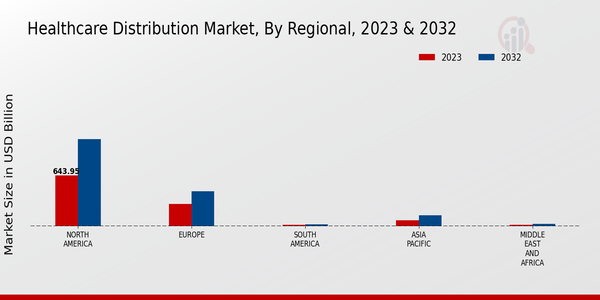Healthcare Distribution Market Overview
As per MRFR analysis, the Healthcare Distribution Market Size was estimated at 796.21 (USD Billion) in 2024. The Healthcare Distribution Market Industry is expected to grow from 844.32 (USD Billion) in 2025 to 1,431.56 (USD Billion) till 2034, at a CAGR (growth rate) is expected to be around 6.04% during the forecast period (2025 - 2034).
Key Healthcare Distribution Market Trends Highlighted
Key market drivers in the Healthcare Distribution Market include the rising demand for healthcare services, increasing adoption of technology, and government initiatives to improve healthcare infrastructure.
Opportunities exist in expanding into emerging markets, leveraging data analytics for personalized healthcare, and partnering with healthcare providers to offer value-added services. Recent trends include the rise of digital distribution channels, increased focus on patient centricity, and the growing importance of supply chain optimization.
Distributors are exploring innovative strategies such as value-based pricing, predictive analytics, and automation to meet the evolving needs of the market and enhance customer satisfaction.
 Source: Primary Research, Secondary Research, MRFR Database and Analyst Review
Source: Primary Research, Secondary Research, MRFR Database and Analyst Review
Healthcare Distribution Market Drivers
Aging Population
The aging population is a major driver of growth in the Healthcare Distribution Market Industry. As people age, they are more likely to experience chronic conditions which require ongoing treatment and medication.
This increased demand for healthcare products and services is driving growth in the healthcare distribution market. According to the World Health Organization, the global population of people aged 65 and over is expected to reach 1.5 billion by 2050.
This aging population will put a strain on healthcare systems around the world and will lead to increased demand for healthcare products and services. The aging population is also leading to a change in the types of healthcare products and services that are needed.
As people age, they are more likely to need home healthcare services, such as nursing care and physical therapy. They are also more likely to need medical devices, such as wheelchairs and walkers.
This shift in demand is driving growth in the home healthcare and medical device segments of the healthcare distribution market.
Healthcare distributors are responding to the aging population by expanding their product offerings and services. They are also investing in new technologies, such as telemedicine and e-commerce, to make it easier for patients to access healthcare products and services.
Technological Advancements
Technological advancements are another major driver of growth in the Healthcare Distribution Market Industry. New technologies are making it possible to improve the efficiency and accuracy of healthcare distribution.
For example, automated inventory management systems can help distributors track inventory levels and ensure that products are available when and where they are needed.
Telemedicine technologies can allow patients to consult with doctors remotely, which can reduce the need for in-person visits and improve access to healthcare services. Technological advancements are also leading to the development of new healthcare products and services.
For example, 3D printing is being used to create custom prosthetics and medical devices. This is providing patients with new options for treatment and improving their quality of life. Healthcare distributors are investing in new technologies to stay ahead of the curve and meet the changing needs of their customers. They are also partnering with technology companies to develop new products and services.
Rising Healthcare Costs
Rising healthcare costs are also driving growth in the Healthcare Distribution Market Industry. As healthcare costs continue to rise, patients are increasingly looking for ways to save money on their healthcare expenses.
Healthcare distributors can help patients to save money by offering discounts on products and services. They can also help patients to find financial assistance programs that can help them to pay for their healthcare costs. Rising healthcare costs are also leading to increased demand for generic drugs.
Generic drugs are cheaper than brand-name drugs, and they are just as effective. Healthcare distributors are responding to this demand by increasing their offerings of generic drugs.
Healthcare Distribution Market Segment Insights:
Healthcare Distribution Market Product Type Insights
The Healthcare Distribution Market is segmented by product type into pharmaceuticals, medical devices, consumables, and over-the-counter products. The pharmaceuticals segment is expected to account for the largest share of the market by 2024 due to the increasing prevalence of chronic diseases and the rising demand for new and innovative drugs.
The medical devices segment is also expected to grow significantly, driven by the increasing adoption of minimally invasive procedures and the growing demand for personalized medicine. The consumables segment is expected to grow steadily, driven by the increasing demand for medical supplies and equipment.
The market growth is attributed to the increasing demand for healthcare products and services, the rising prevalence of chronic diseases, and the growing adoption of new technologies. The market is also expected to benefit from the increasing government spending on healthcare and the growing awareness of health and wellness.
The pharmaceuticals segment is expected to account for the largest share of the Healthcare Distribution Market by 2024 due to the increasing prevalence of chronic diseases and the rising demand for new and innovative drugs.
The segment is also expected to benefit from the increasing government spending on healthcare and the growing awareness of health and wellness.
The medical devices segment is also expected to grow significantly, driven by the increasing adoption of minimally invasive procedures and the growing demand for personalized medicine.
The segment is also expected to benefit from the increasing government spending on healthcare and the growing awareness of health and wellness. The consumables segment is expected to grow steadily, driven by the increasing demand for medical supplies and equipment.
The segment is also expected to benefit from the increasing government spending on healthcare and the growing awareness of health and wellness.
The over-the-counter products segment is also expected to grow, driven by the increasing demand for self-care products and the growing awareness of health and wellness. The segment is also expected to benefit from the increasing government spending on healthcare and the growing awareness of health and wellness.
 Source: Primary Research, Secondary Research, MRFR Database and Analyst Review
Source: Primary Research, Secondary Research, MRFR Database and Analyst Review
Healthcare Distribution Market Distribution Channel Insights
The Healthcare Distribution Market is segmented into various distribution channels, including wholesalers, retail pharmacies, hospitals, and e-commerce. Each channel plays a crucial role in the distribution of healthcare products and services.
Wholesalers are responsible for distributing healthcare products from manufacturers to various healthcare providers, such as hospitals, clinics, and pharmacies. They play a vital role in ensuring the timely and efficient delivery of healthcare products, particularly in remote areas or during emergencies.
The Healthcare Distribution Market through wholesalers is expected to reach $520.5 billion by 2024, growing at a CAGR of 5.6%. Retail pharmacies are another important distribution channel for healthcare products.
They provide direct access to patients and offer a wide range of healthcare products, including prescription drugs, over-the-counter medications, and health and beauty aids.
The Healthcare Distribution Market through retail pharmacies is expected to reach $465.2 billion by 2024, growing at a CAGR of 4.5%. Hospitals are major purchasers of healthcare products and often have their own distribution channels.
They procure healthcare products directly from manufacturers or through wholesalers and distribute them to patients within the hospital setting. The Healthcare Distribution Market through hospitals is expected to reach $390.4 billion by 2024, growing at a CAGR of 3.8%.
E-commerce is emerging as a rapidly growing distribution channel for healthcare products. It offers convenience, accessibility, and a wide selection of products to patients. The Healthcare Distribution Market through e-commerce is expected to reach $230.7 billion by 2024, growing at a CAGR of 12.6%.
Healthcare Distribution Market End User Insights
The Healthcare Distribution Market is segmented into various end-user segments, including hospitals, clinics, patients, and nursing homes. Hospitals accounted for the largest share of the market in 2023 and are projected to continue to dominate the market over the forecast period.
The growth of the hospital segment can be attributed to the increasing number of hospital admissions, the rising prevalence of chronic diseases, and the growing demand for specialized healthcare services. Clinics are another major end-user segment in the Healthcare Distribution Market and are expected to grow at a significant CAGR during the forecast period.
This growth can be attributed to the increasing number of outpatient visits, the growing popularity of ambulatory surgery centers, and the rising demand for preventive healthcare services. Patients are also a significant end-user segment in the Healthcare Distribution Market and are expected to grow at a steady pace over the forecast period.
The growth of this segment can be attributed to the rising prevalence of chronic diseases, the increasing number of self-medication practices, and the growing demand for home healthcare services. Nursing homes are the smallest end-user segment in the Healthcare Distribution Market and are expected to grow at a moderate CAGR during the forecast period.
The growth of this segment can be attributed to the increasing number of elderly people, the rising prevalence of chronic diseases among the elderly, and the growing demand for long-term care services.
Healthcare Distribution Market Therapeutic Area Insights
The Therapeutic Area segment plays a crucial role in the Healthcare Distribution Market, influencing market growth and dynamics. Cardiovascular, Oncology, Diabetology, Respiratory, and Neurology sub-segments hold significant market shares and offer unique insights.
Cardiovascular, with a market size of USD 156.8 billion in 2023, is projected to reach USD 215.6 billion by 2032, exhibiting a CAGR of 3.6%. The rising prevalence of cardiovascular diseases, coupled with advancements in treatment options, drives growth.
Oncology, valued at USD 128.3 billion in 2023, is expected to grow to USD 206.7 billion by 2032, reflecting a CAGR of 5.4%, fueled by the increasing incidence of cancer and the development of innovative therapies.
Diabetology, with a market size of USD 85.4 billion in 2023, is projected to reach USD 132.1 billion by 2032, exhibiting a CAGR of 4.8%, driven by the growing diabetic population and the demand for effective diabetes management solutions.
Respiratory, valued at USD 78.2 billion in 2023, is expected to grow to USD 119.3 billion by 2032, reflecting a CAGR of 4.7%, attributed to the rising prevalence of respiratory diseases and the increasing adoption of advanced respiratory care devices.
Neurology, with a market size of USD 67.5 billion in 2023, is projected to reach USD 102.3 billion by 2032, exhibiting a CAGR of 4.6%, driven by the growing incidence of neurological disorders and the demand for specialized neurology treatments.
Healthcare Distribution Market Regional Insights
The Healthcare Distribution Market is segmented geographically into North America, Europe, APAC, South America, and MEA. North America was the largest regional market, accounting for over 40% of the global revenue in 2023. The region has a highly developed healthcare system, with a large population of elderly patients and a high prevalence of chronic diseases.
Europe is the second-largest regional market, with a strong presence of pharmaceutical and medical device companies. APAC is the fastest-growing regional market, driven by increasing healthcare spending and rising demand for healthcare products and services.
South America and MEA are smaller regional markets, but they are expected to grow at a steady pace in the coming years.
 Source: Primary Research, Secondary Research, MRFR Database and Analyst Review
Source: Primary Research, Secondary Research, MRFR Database and Analyst Review
Healthcare Distribution Market Key Players and Competitive Insights:
Major players in the Healthcare Distribution Market industry are constantly striving to gain a competitive edge by investing in research and development, expanding their product portfolios, and forming strategic partnerships.
Leading Healthcare Distribution Market players are adopting innovative technologies such as artificial intelligence (AI) and machine learning (ML) to improve their supply chain efficiency, enhance customer service, and develop personalized solutions.
Healthcare Distribution Market development is driven by the increasing demand for healthcare products and services, coupled with the rising prevalence of chronic diseases and the aging population.
The competitive landscape is characterized by a mix of large, established players and emerging regional players. Mergers and acquisitions are prevalent in the industry as companies seek to consolidate their market position and expand their geographic reach.
Cardinal Health is a leading provider of healthcare products and services to hospitals, pharmacies, and other healthcare providers. The company offers a comprehensive portfolio of products and services, including pharmaceuticals, medical supplies, and equipment.
Cardinal Health has a strong distribution network and a large customer base. The company has been investing in technology and automation to improve its supply chain efficiency and reduce costs. Cardinal Health is also expanding its product portfolio through acquisitions and partnerships.
AmerisourceBergen is another major player in the Healthcare Distribution Market industry. The company provides a range of healthcare products and services, including pharmaceuticals, medical supplies, and equipment. AmerisourceBergen has a strong distribution network and a large customer base.
The company has been investing in technology and automation to improve its supply chain efficiency and reduce costs. AmerisourceBergen is also expanding its product portfolio through acquisitions and partnerships.
Key Companies in the Healthcare Distribution Market Include:
- AmerisourceBergen Corporation
Healthcare Distribution Market Industry Developments
The increasing prevalence of chronic diseases, rising healthcare expenditure, and growing demand for personalized medicine are driving the market growth. Additionally, technological advancements such as automation, data analytics, and blockchain are revolutionizing the healthcare supply chain, leading to improved efficiency and cost reduction.
Key market players are focusing on strategic acquisitions and partnerships to expand their geographical reach and product portfolios. Recent news developments include the acquisition of AmerisourceBergen by Walgreens Boots Alliance and the partnership between Cardinal Health and McKesson to enhance their distribution capabilities.
These developments highlight the evolving landscape of the healthcare distribution market as companies strive to meet the changing needs of healthcare providers and patients.
Healthcare Distribution Market Segmentation Insights
Healthcare Distribution Market Product Type Outlook
- Over-the-Counter Products
Healthcare Distribution Market Distribution Channel Outlook
Healthcare Distribution Market End User Outlook
Healthcare Distribution Market Therapeutic Area Outlook
Healthcare Distribution Market Regional Outlook
| Report Attribute/Metric |
Details |
|
Market Size 2024
|
796.21 (USD Billion)
|
|
Market Size 2025
|
844.32 (USD Billion)
|
|
Market Size 2034
|
1,431.56 (USD Billion)
|
|
Compound Annual Growth Rate (CAGR)
|
6.04 % (2025 - 2034)
|
|
Report Coverage
|
Revenue Forecast, Competitive Landscape, Growth Factors, and Trends
|
|
Base Year
|
2024
|
|
Market Forecast Period
|
2025 - 2034
|
|
Historical Data
|
2020 - 2024
|
| Market Forecast Units |
USD Billion |
| Key Companies Profiled |
Henry Schein Inc., AmerisourceBergen Corporation, Walgreens Boots Alliance, Roche Holding AG, Sanofi S.A., Owens Minor Inc., AmerisourceBergen Corp, Johnson Johnson, Cardinal Health, Pfizer Inc., McKesson Corporation, Medline Industries Inc., Novartis AG |
| Segments Covered |
Product Type, Distribution Channel, End User, Therapeutic Area, Regional |
| Key Market Opportunities |
Personalized medicine Growth in emerging markets Digitalization of supply chains Specialty drugs E-commerce platforms |
| Key Market Dynamics |
Rising demand, technological advancements, cost optimization strategies, government initiatives, and consolidation |
| Countries Covered |
North America, Europe, APAC, South America, MEA |
Frequently Asked Questions (FAQ) :
The Healthcare Distribution Market reached a valuation of 708.05 billion USD in 2023.
The Healthcare Distribution Market is anticipated to grow at a CAGR of 6.04% from 2025 to 2034.
The growth of the Healthcare Distribution Market is attributed to factors such as rising demand for healthcare products, increasing prevalence of chronic diseases, and advancements in healthcare technology.
North America is projected to dominate the Healthcare Distribution Market by 2032 due to its well-established healthcare infrastructure and high healthcare expenditure.
Healthcare distribution encompasses activities such as the storage, transportation, and delivery of medical supplies, pharmaceuticals, and equipment to hospitals, clinics, and other healthcare facilities.
Major players in the Healthcare Distribution Market include McKesson Corporation, Cardinal Health, AmerisourceBergen, and Walgreens Boots Alliance.
The Healthcare Distribution Market is projected to reach a valuation of 1431.56 billion USD by 2034.
The Healthcare Distribution Market faces challenges such as regulatory complexities, supply chain disruptions, and increasing competition from e-commerce platforms.
Technology is transforming the Healthcare Distribution Market through advancements such as automation, data analytics, and blockchain for enhanced efficiency and transparency.
Emerging trends in the Healthcare Distribution Market include personalized medicine, the rise of value-based healthcare, and the adoption of sustainable practices.

















